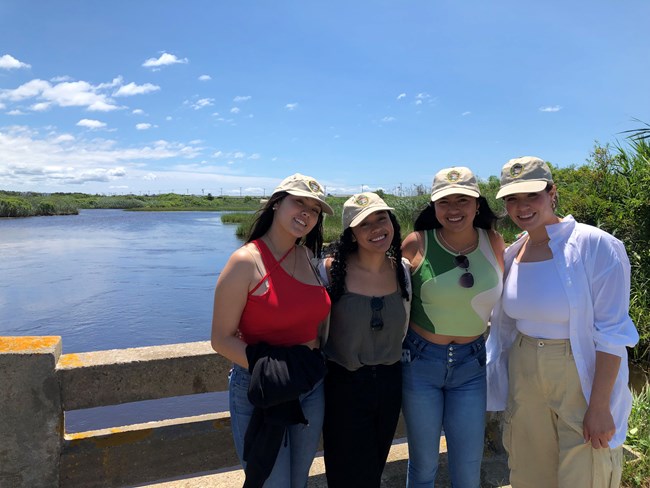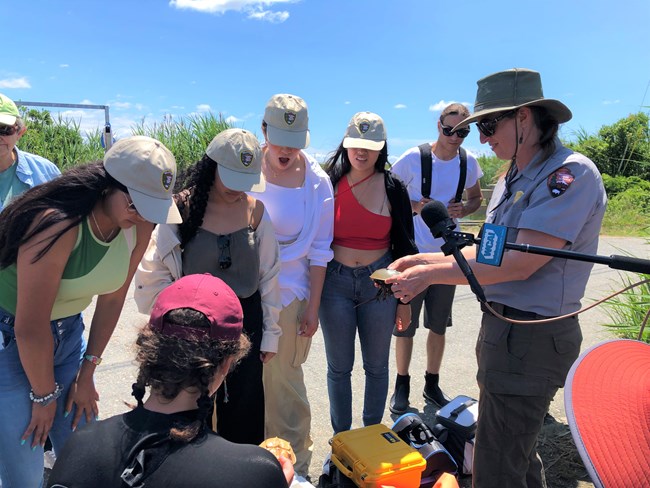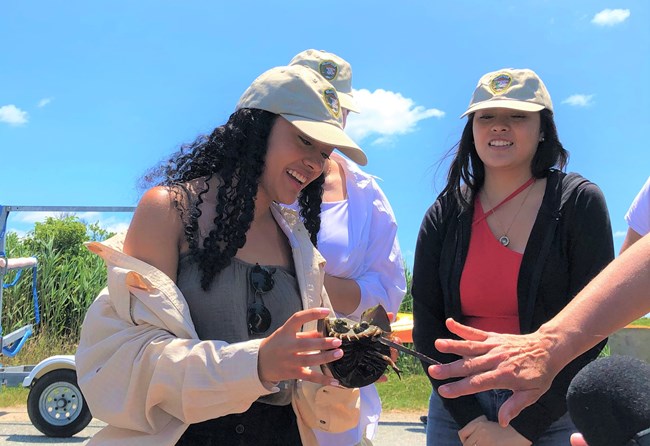Last updated: August 4, 2023
Article
Mexican Women’s National Park Service Exchange Program in Cape Cod National Seashore

NPS image by Linda Bennett.
During the week of July 9, 2023, four young Mexican women took part in an exchange program at Cape Cod National Seashore in Massachusetts. Yolanda Peñaloza, Valeria Aguilar, Alejandra García, and Ireri Servín traveled from their hometown of Pátzcuaro in the state of Michoacán to learn about the Herring River Restoration Plan. It took the park and multiple stakeholders over 30 years to develop the plan which will restore the river’s salt marsh estuary.
The women hoped that gaining insights from that project would help them save their beloved Lake Patzcuaro. “We four seek to give voice to the lake which will die without the help of everyone who loves her,” said Alejandra. The women’s program was organized by the Friends of the Herring River and supported by the National Park Service, International Volunteers in Parks Program which coordinates training opportunities for international students and international park staff in the US national parks.
The women are 21-year-old students at the Universidad Michoacán de San Nicolas de Hidalgo. They are also senior interns at the Campamento de la Paz en Patzcuaro, a leadership development and social action youth training program. “Because of the Campamento, I became passionate about making my community a better place,” said Yolanda.
In Mexico, the women developed an understanding of Lake Patzcuaro’s problems, and began forming a vision to restore their lake. “We need to develop a culture that cherishes our natural resources and commits to sustaining them in full health,” said Valeria. She added, “We also need to bring together a wide number of groups all around the lake to focus on this effort and commit to making change.” When they heard about the Herring River Restoration from their mentor, the women realized that learning about its success could help them in their efforts to clean-up their lake.
These inspiring women spent nine months preparing for their trip to Cape Cod National Seashore, researching Lake Patzcuaro’s environmental issues, refining public speaking skills, and raising funds. The National Park Service’s International Volunteers in Parks Program assisted them with their J-1 visas; however, there were many twists and turns in the process, requiring multiple trips to the US Consulate.
Lake Patzcuaro is one of Mexico’s most treasured natural resources, but it is severely polluted and silted. It is an enclosed basin formed from drainage of the steep mountains surrounding it. This makes it extremely vulnerable since it has no outflow to the sea. Alejandra stated, “in a few years, if we do not take immediate action, we will no longer have our lake. Its shoreline will shrink to nothing, and its water will shrink to just a scattering of little pools.” This once beautiful lake that Indigenous people depended on for fishing is now filled with sewage, garbage, agricultural run-off, toxic chemicals, and pesticides. As the lake retreats, important wetlands and wildlife are being lost, and the water is unsafe for humans. “We have to buy all of our drinking water in a bottle,” said Ireri.

NPS image by Linda Bennett.
Throughout their program in Cape Cod National Seashore, the Mexican women had many opportunities to learn how the Herring River Restoration project was organized. They met with national seashore staff and ten other stakeholders communicating the immense challenges they face cleaning up their lake. The women described the many factors that have caused Lake Patzcuaro’s degradation. Government corruption, deforestation, invasive species, inadequate waste disposal, and failing sewage treatment plants have all contributed to its decline. Many research studies have been done on the lake’s environmental problems and several restoration projects have been planned during the last twenty years, but so far, none have even gotten off the ground. There is a lack of trust in the government,” said Yolanda. “People believe that nothing will ever be done,” she said.
Despite their differences, Lake Patzcuaro and the Herring River have a few similarities as both have several towns nearby whose economies depend on tourism and fishing. Gaining local support for the restoration was a major effort by the park and the Friend’s Group. Many concerns and much opposition were expressed during the negotiations. Removing a 100-year-old dam at the base of the river would change the landscape and flood some private properties. However, as these issues were addressed, residents eventually saw the project’s environmental merits and came together to support the plan. Reflecting on what she learned, Valeria said, “you must listen to all the voices, especially the negative ones.”
The national seashore staff shared important points about its role in the restoration with the women. They learned how the park developed community support through education and outreach efforts. Most importantly, they listened to the women’s challenges and offered advice on how to begin their work in Patzcuaro. They learned about the park’s salt marsh ecology, visited field sites, and had opportunities to work with the park’s natural resources team. Encountering a horseshoe crab for a first time in their lives was an astonishing surprise. Additionally, the women gave a presentation at the park’s visitor center to an audience of 30 people and narrated a film about Lake Patzcuaro. They also had opportunities to speak to local newspapers, a local TV station, and to a local NPR affiliate.

NPS image by Linda Bennett.
Tags
- cape cod national seashore
- international cooperation
- international volunteers
- international volunteers in parks
- massachusetts
- conservation
- science
- oceans
- youth
- partnerships
- resource hot topics
- diversity
- mexico
- latin america
- cultural exchange
- natural resouces
- salt marsh
- environmental restoration
- leadership






